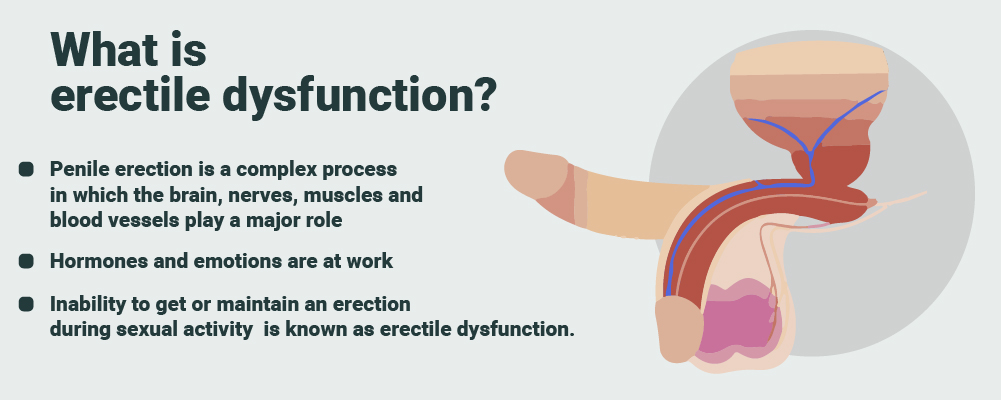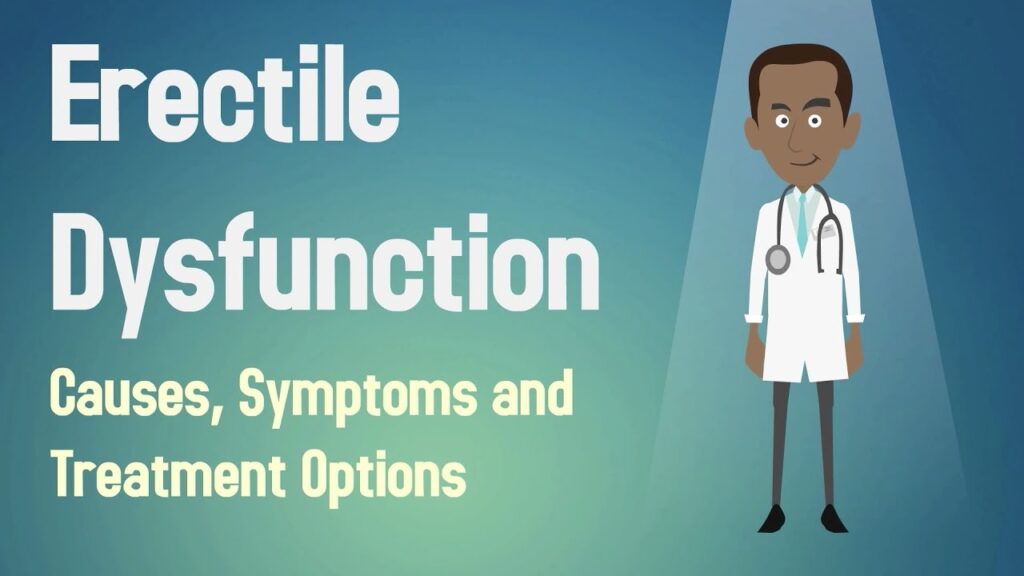Understanding Erectile Dysfunction in Telugu: ఎడ్రక్టిల్డిస్ఫంక్షన్ గురించి

What is Erectile Dysfunction?

Erectile dysfunction, commonly known as impotence, is a condition characterized by the inability to achieve or maintain an erection sufficient for sexual intercourse. It is a prevalent issue that affects a significant number of men worldwide. This condition can have a profound impact on the quality of life and can lead to emotional distress, relationship problems, and decreased self-esteem.
Erectile dysfunction can have various causes, including physical, psychological, and lifestyle factors. Physical causes may include underlying health conditions such as cardiovascular disease, diabetes, hormonal imbalances, and neurological disorders. Psychologically, stress, anxiety, depression, and relationship conflicts can contribute to the development or worsening of erectile dysfunction. Additionally, certain lifestyle choices such as smoking, excessive alcohol consumption, substance abuse, and a sedentary lifestyle can increase the risk of developing erectile dysfunction.
It is essential to understand the underlying causes of erectile dysfunction to determine the most appropriate treatment approach. Seeking consultation with a healthcare professional, such as a urologist or a primary care physician, is crucial for an accurate diagnosis and personalized treatment plan. By addressing the root cause of the condition, individuals can effectively manage and improve their sexual function, enhancing their overall well-being and sexual satisfaction.
Causes of Erectile Dysfunction

Erectile dysfunction (ED) has a multitude of causes, both physical and psychological, that can contribute to its occurrence in men. One common physical cause is the restriction of blood flow to the penis, which can be a result of conditions such as atherosclerosis, high blood pressure, or diabetes. These conditions can damage the blood vessels and impair their ability to deliver adequate blood flow to the penile region, causing difficulties in achieving or maintaining an erection.
Another physical cause of ED is hormonal imbalances, particularly involving testosterone. Testosterone is a key hormone in male sexual functioning, and a decrease in its levels can lead to decreased libido and problems with erections. Hormonal imbalances can be attributed to various factors, such as obesity, certain medications, or underlying health conditions. In addition, certain neurological conditions, such as multiple sclerosis or Parkinson’s disease, can affect the nerve signals involved in erection, leading to erectile dysfunction.
Psychological factors can also play a significant role in the development of erectile dysfunction. Stress, anxiety, depression, or relationship issues can all contribute to difficulties in achieving or maintaining an erection. Moreover, the fear of experiencing erectile difficulties can lead to a cycle of performance anxiety, further worsening the problem.
As individuals experience ED for diverse reasons, it is crucial to consult with a healthcare professional to determine the underlying cause and develop a personalized treatment plan. Identifying and addressing the root cause of erectile dysfunction is essential in effectively managing this condition and improving overall sexual health.
Risk Factors for Erectile Dysfunction
Several risk factors can contribute to the development of erectile dysfunction. One of the most common risk factors is age. As men get older, the likelihood of experiencing erectile dysfunction increases. This is due to a combination of factors such as decreased blood flow to the penis, hormonal changes, and the presence of other medical conditions that are more prevalent in older individuals.
Another significant risk factor for erectile dysfunction is underlying health conditions. Chronic diseases such as diabetes, heart disease, high blood pressure, and obesity can all contribute to erectile dysfunction. These conditions can impair blood flow, damage blood vessels, and affect hormone production, all of which are crucial for achieving and maintaining an erection. Additionally, certain medications used to treat these health conditions may also have side effects that contribute to erectile dysfunction.
It is important to note that while age and underlying health conditions are common risk factors, other factors such as smoking, excessive alcohol consumption, drug use, stress, and certain psychological factors can also play a role in erectile dysfunction. Understanding these risk factors can help individuals take proactive steps to prevent or manage erectile dysfunction effectively. In the following sections, we will explore the signs and symptoms of erectile dysfunction and discuss the various diagnosis and treatment options available.
Signs and Symptoms of Erectile Dysfunction

Erectile dysfunction (ED), also known as impotence, is a condition that affects the ability of a man to achieve and maintain an erection sufficient for sexual activity. It is important to note that occasional difficulty achieving an erection is common and does not necessarily indicate a chronic issue. However, if the problem persists and becomes a recurring occurrence, it may be a sign of erectile dysfunction.
One of the primary signs of erectile dysfunction is the inability to achieve or maintain an erection during sexual activity. This can manifest as a complete inability to achieve an erection, or as difficulty in sustaining the erection for the duration of sexual intercourse. Additionally, men with erectile dysfunction may also experience a reduced sexual desire or interest, known as a decreased libido. It is crucial to seek medical attention if any of these symptoms persist, as erectile dysfunction can have a significant impact on both physical and mental well-being.
Diagnosis of Erectile Dysfunction
When it comes to diagnosing erectile dysfunction (ED), healthcare providers use a comprehensive approach to ensure accurate assessment and appropriate treatment. The diagnosis typically involves a thorough medical history review, physical examination, and various tests. It is important to note that the diagnosis of ED is a sensitive matter, and healthcare professionals prioritize patient comfort and confidentiality throughout the process.
During the medical history review, your healthcare provider will ask a series of questions to understand your symptoms, including the onset and duration of ED, any potential underlying conditions, and any medications or lifestyle factors that may contribute to the problem. This discussion allows the healthcare provider to gather important information that can help in identifying the potential causes of your erectile issues. Additionally, they may inquire about your overall health, including any chronic conditions, recent surgeries, or psychological factors that could be associated with ED.
• The medical history review is an essential part of diagnosing erectile dysfunction.
• Healthcare providers will ask questions about the onset and duration of ED symptoms.
• They will inquire about potential underlying conditions and medications that may contribute to the problem.
• Lifestyle factors such as smoking, alcohol consumption, and exercise habits may also be discussed.
• Overall health, including chronic conditions, recent surgeries, or psychological factors, will be considered.
After the medical history review, a physical examination is typically conducted. This examination aims to assess your overall health and identify any physical abnormalities or signs that may contribute to erectile dysfunction. During this process, healthcare providers may check your blood pressure, examine your genitals for any structural issues or abnormalities in blood flow. Additionally, they might evaluate other aspects of your physical health such as body mass index (BMI), waist circumference measurements or signs of hormonal imbalances.
• A thorough physical examination is conducted after the medical history review.
• Blood pressure is checked during the examination.
• Genital examination helps identify any structural issues or problems with blood flow.
• Other aspects of physical health are assessed such as BMI and waist circumference measurements.
In some cases where there is no clear cause identified through medical history and physical examination alone further tests are required. These tests can help determine if there are underlying causes contributing to erectile dysfunction. Common diagnostic tests include:
– Blood Tests: These tests measure hormone levels (such as testosterone) which play a crucial role in sexual function. They can also detect indications of diabetes cholesterol levels etc., which could be associated with ED
– Urine Tests: Urinalysis can provide information on kidney function and potential urinary tract infections that might contribute to ED symptoms
– Ultrasound: Penile ultrasound uses sound waves to create images of blood vessels within the penis. It can help diagnose vascular problems that affect erections
– Psychological Evaluation: In some cases where psychological factors are suspected contributors to ED, a psychological evaluation may be recommended. This can involve questionnaires or interviews with mental health professionals
– Nocturnal Penile Tumescence (NPT) Test: This test measures the frequency and strength of nighttime erections. It can help differentiate between physical and psychological causes of ED
• Additional tests may be required if no clear cause is identified through medical history and physical examination alone.
• Blood tests measure hormone levels and detect indications of diabetes or cholesterol levels.
• Urine tests provide information on kidney function and potential urinary tract infections.
• Ultrasound helps diagnose vascular problems affecting erections.
• Psychological evaluations are recommended in cases where psychological factors are suspected contributors to ED.
• The NPT test measures nighttime erections to differentiate between physical and psychological causes.
In conclusion, diagnosing erectile dysfunction involves a comprehensive approach that includes a medical history review, physical examination, and various diagnostic tests. Healthcare providers prioritize patient comfort and confidentiality throughout the process. By gathering detailed information about symptoms, underlying conditions, medications, lifestyle factors, as well as conducting thorough examinations and appropriate testing, healthcare professionals can accurately identify the potential causes of erectile issues. This comprehensive approach ensures that patients receive proper treatment tailored to their specific needs.
Medical Treatments for Erectile Dysfunction
Pharmaceutical Treatments
Pharmaceutical treatments are often the first line of approach for individuals with erectile dysfunction (ED). These medications work by enhancing the blood flow to the penis, helping to achieve and maintain an erection. The most commonly prescribed medications are phosphodiesterase type-5 (PDE-5) inhibitors such as sildenafil (Viagra), tadalafil (Cialis), and vardenafil (Levitra). These drugs work by inhibiting the enzyme responsible for breaking down cGMP, a chemical that relaxes the smooth muscles in the penis, allowing blood to flow and facilitate an erection.
It is important to note that these medications are prescription-only and should be taken under the guidance of a healthcare professional. They may not be suitable for everyone, especially individuals with underlying health conditions or taking certain medications. Potential side effects include headache, dizziness, nasal congestion, and flushing. Therefore, it is crucial to discuss any existing health conditions and current medications with a doctor to ensure safe and effective use of these pharmaceutical treatments.
Medical Devices
When medications are ineffective or not suitable, medical devices can be a viable option for treating erectile dysfunction. Vacuum constriction devices (VCDs), also known as penis pumps, are commonly recommended. These devices consist of a vacuum tube that is placed over the penis and a handheld pump to create negative pressure, drawing blood into the penis and causing an erection. A constriction band is then applied at the base of the penis to maintain the erection. VCDs are generally safe to use and can be an effective treatment for some individuals. However, it is essential to follow the instructions provided by the manufacturer and consult with a healthcare professional for appropriate usage and adjustment.
Lifestyle Changes to Manage Erectile Dysfunction
Making certain lifestyle changes can play a significant role in managing erectile dysfunction (ED) and improving sexual health. Adopting a healthy and balanced diet can positively impact overall well-being and sexual function. Incorporating foods that are rich in antioxidants, such as fruits, vegetables, whole grains, and lean proteins, can promote better blood flow and prevent oxidative stress, which are key factors in maintaining healthy erectile function. Additionally, avoiding excessive consumption of alcohol, tobacco, and recreational drugs can help reduce the risk of developing or worsening ED.
Regular physical activity is another important aspect of managing ED. Engaging in regular exercise not only helps improve cardiovascular health but also promotes blood circulation throughout the body, including the genitals. Cardiovascular exercises such as jogging, swimming, or cycling can be particularly beneficial in improving blood flow and enhancing sexual performance. It is worth noting that consulting with a healthcare professional before starting any exercise regimen is crucial, especially for individuals with pre-existing medical conditions.
Lifestyle changes can play a significant role in managing erectile dysfunction (ED), either independently or in conjunction with other treatment approaches. Here’s a table summarizing some key lifestyle changes that may help manage ED:
| Lifestyle Change | Description | Source of Information |
|---|---|---|
| Regular Exercise | Engaging in regular physical activity can improve overall cardiovascular health, promoting blood flow and reducing the risk of ED. | Journal of Sexual Medicine. 2017 May;14(5):679-683 |
| Healthy Diet | Adopting a diet rich in fruits, vegetables, whole grains, lean proteins, and low in saturated fats can support cardiovascular health. | Journal of Sexual Medicine. 2017 May;14(5):679-683 |
| Weight Management | Maintaining a healthy weight is crucial, as obesity is linked to ED. Weight loss can improve overall health and reduce ED risk. | Urology. 2014 Jan;83(1):13-8 |
| Limiting Alcohol Intake | Excessive alcohol consumption can contribute to ED. Moderating alcohol intake may improve sexual function. | Urology. 2015 Feb;85(2):509-16 |
| Quitting Smoking | Smoking is a risk factor for ED. Quitting smoking improves cardiovascular health and can benefit sexual function. | American Urological Association |
| Stress Management | Chronic stress can contribute to ED. Practicing stress-reduction techniques such as meditation or yoga may help manage symptoms. | Journal of Sexual Medicine. 2013 Jan;10(1):111-21 |
| Quality Sleep | Poor sleep quality is linked to hormonal imbalances and ED. Establishing healthy sleep patterns is essential for overall well-being. | Journal of Sexual Medicine. 2015 Feb;12(2):331-8 |
| Communication with Partner | Open communication with a partner about sexual concerns and feelings of intimacy can positively impact the management of ED. | Journal of Sexual Medicine. 2015 Nov;12(11):2216-21 |
Psychological Factors and Erectile Dysfunction
Psychological factors, such as stress and anxiety, can play a significant role in the development and progression of erectile dysfunction (ED). While ED is often associated with physical causes, it is essential to understand the impact that psychological factors can have on a man’s sexual health.
Research has shown that stress, whether related to work, relationships, or other life situations, can lead to hormonal imbalances and increased levels of cortisol. These physiological changes can negatively affect the body’s ability to achieve and maintain an erection. Furthermore, anxiety, depression, and low self-esteem can also contribute to ED by impairing sexual desire and performance.
It is crucial for individuals experiencing psychological factors contributing to ED to seek appropriate professional help. A skilled therapist or counselor can provide support and guidance in managing stress, anxiety, and other emotional issues that may be affecting sexual health. Additionally, cognitive-behavioral therapy (CBT) techniques have proven effective in addressing and managing psychological factors associated with ED. CBT can help individuals identify and challenge negative thoughts and beliefs surrounding their sexual performance, thus improving overall sexual well-being.
Relationship Impact of Erectile Dysfunction
Erectile dysfunction (ED) can have a significant impact on the relationships of those affected by it. Intimate and romantic connections may suffer as individuals and their partners cope with the physical and emotional challenges associated with this condition. The frustration, embarrassment, and feelings of inadequacy that often accompany ED can strain communication and intimacy, leading to tension and conflict within the relationship.
Partners of individuals with ED may also experience feelings of rejection, self-doubt, and reduced self-esteem. This can occur when they interpret their partner’s difficulties in achieving or maintaining an erection as a reflection of their attractiveness or desirability. Moreover, the avoidance of sexual activity due to the fear of failure or performance anxiety can lead to a decrease in overall affection and intimacy between partners.
It is essential for couples facing the impact of ED to approach the situation with empathy, understanding, and open communication. Seeking professional guidance from a healthcare provider, such as a sexologist or therapist, can be beneficial in navigating the emotional and interpersonal challenges associated with this condition. By working together as a team, couples can find ways to support each other and explore alternative forms of intimacy, fostering a stronger emotional bond regardless of the physical limitations caused by ED.
Prevention and Maintenance of Erectile Dysfunction
Prevention of Erectile Dysfunction requires a multifaceted approach that focuses on maintaining a healthy lifestyle and managing risk factors. One significant aspect is maintaining a healthy weight through a balanced diet and regular exercise. Research has shown that obesity increases the risk of developing erectile dysfunction, as it can lead to various underlying conditions such as diabetes, high blood pressure, and high cholesterol, all of which can impair erectile function. Incorporating a diet rich in fruits, vegetables, whole grains, lean proteins, and healthy fats can help optimize overall cardiovascular health, which is essential for a healthy blood flow to the penis.
Additionally, managing chronic medical conditions such as diabetes, hypertension, and heart disease is crucial in preventing erectile dysfunction. Following a prescribed treatment plan, including taking medications as directed, controlling blood sugar levels, and maintaining regular check-ups with healthcare professionals, can greatly reduce the risk of developing erectile dysfunction. Furthermore, quitting smoking and limiting alcohol consumption are essential steps towards preventing and maintaining erectile function. Both smoking and excessive alcohol use have been linked to erectile dysfunction, as they can damage blood vessels and impair circulation to the penis.
It is important to note that prevention strategies may differ depending on individual circumstances and underlying causes of erectile dysfunction. Therefore, consulting a healthcare professional for personalized recommendations is crucial in implementing effective preventive measures. With the right guidance and a proactive approach, individuals can take charge of their sexual health and reduce the risk of developing erectile dysfunction.
Alternative Therapies for Erectile Dysfunction
Alternative therapies are becoming increasingly popular among individuals seeking non-pharmaceutical solutions for erectile dysfunction. These therapies aim to address the root causes of the condition and promote overall sexual health. One alternative therapy that has shown promise is acupuncture. Acupuncture involves the insertion of thin needles into specific points on the body to stimulate energy pathways. According to a study published in the Journal of Alternative and Complementary Medicine, acupuncture has demonstrated potential in improving erectile function and sexual satisfaction in men with erectile dysfunction. While more research is needed to fully understand the effectiveness of acupuncture as a treatment for erectile dysfunction, preliminary findings are encouraging.
Another alternative therapy worth considering is the use of herbal supplements. Certain herbal supplements, such as ginseng, L-arginine, and yohimbe, have been studied for their potential benefits in treating erectile dysfunction. For instance, a research review published in the International Journal of Impotence Research suggested that Panax ginseng may improve erectile function and sexual satisfaction. However, it is important to note that the use of herbal supplements should be approached with caution and under the guidance of a healthcare professional. Herbal supplements can interact with medications and may have side effects. Furthermore, the quality and purity of these supplements can vary greatly, so it is crucial to choose reputable brands and products that have been tested for safety and efficacy.
While alternative therapies may offer potential benefits for erectile dysfunction, it is essential to remember that they are not a substitute for medical advice and treatment. It is crucial for individuals experiencing erectile dysfunction to consult with a healthcare professional who can provide a comprehensive evaluation and recommend appropriate treatment options.
Support and Resources for Erectile Dysfunction
It is crucial for individuals experiencing erectile dysfunction to know that they are not alone in their journey. Seeking support and finding appropriate resources can greatly alleviate the emotional burden and provide valuable guidance. There are various support groups, both online and offline, dedicated to helping individuals and their partners navigate through the challenges of erectile dysfunction. These groups facilitate open discussions, offer a safe space for sharing experiences, and provide helpful advice on coping strategies and available treatments.
In addition to support groups, there are numerous resources available to educate and empower those affected by erectile dysfunction. Reputable websites, such as those run by medical associations or government health departments, offer comprehensive information on the condition, its causes, potential treatments, and lifestyle modifications. Additionally, there are specialized clinics and healthcare professionals who specialize in treating erectile dysfunction and can provide personalized advice and guidance tailored to each individual’s specific needs. Seeking out these resources can ultimately lead to improved understanding, informed decision-making, and the development of effective strategies for managing erectile dysfunction.
Conclusion: Empowering Individuals with Erectile Dysfunction
It is important to acknowledge the impact that erectile dysfunction (ED) can have on an individual’s self-esteem, relationships, and overall quality of life. Fortunately, there are various ways to empower individuals dealing with this condition.
One aspect of empowerment involves gaining a comprehensive understanding of the causes, risk factors, and signs and symptoms of ED. By knowing the underlying factors and being aware of the warning signs, individuals can take proactive steps towards seeking timely medical advice and intervention. Additionally, familiarizing oneself with the available medical treatments, lifestyle modifications, and alternative therapies can provide a sense of control and enable men to make informed decisions about their treatment options.
Moreover, psychological factors play a significant role in the development and management of ED. Recognizing and addressing the emotional and psychological aspects associated with ED can lead to improved overall well-being and enhanced self-confidence. Seeking professional help through counseling or therapy can equip individuals with coping strategies, communication skills, and a better understanding of the impact of stress, anxiety, and depression on sexual function.
Lastly, it is crucial to emphasize the importance of support networks and resources for those dealing with ED. Support groups, online forums, and educational materials provide not only a platform for individuals to share their experiences but also a means of accessing valuable information, guidance, and encouragement. By connecting with others facing similar challenges, individuals can overcome feelings of isolation and find solace in knowing that they are not alone in their journey towards restoring sexual health.
Overall, empowering individuals with ED involves arming them with knowledge, offering psychological support, and connecting them with resources to navigate through the physical and emotional aspects of this condition. Through education, self-awareness, and a comprehensive approach to care, individuals can take charge of their sexual health and regain a sense of control, confidence, and fulfillment in their relationships.
What is erectile dysfunction?
Erectile dysfunction refers to the inability to achieve or maintain an erection sufficient for satisfactory sexual performance.
What are the common causes of erectile dysfunction?
Erectile dysfunction can be caused by various factors such as underlying medical conditions, lifestyle choices, psychological factors, and medication side effects.
What are the risk factors associated with erectile dysfunction?
Risk factors for erectile dysfunction include age, obesity, smoking, diabetes, high blood pressure, heart disease, and certain medications.
What are the signs and symptoms of erectile dysfunction?
The main symptom of erectile dysfunction is the consistent difficulty in achieving or maintaining an erection. Other signs may include reduced sexual desire and difficulty in attaining orgasm.
How is erectile dysfunction diagnosed?
Diagnosis of erectile dysfunction involves a thorough medical history review, physical examination, and possibly additional tests such as blood tests, urine tests, and ultrasound.
What are the medical treatments available for erectile dysfunction?
Medical treatments for erectile dysfunction may include oral medications, injections, vacuum erection devices, penile implants, or surgery, depending on the underlying cause and severity.
Are there any lifestyle changes that can help manage erectile dysfunction?
Yes, certain lifestyle changes like regular exercise, healthy diet, weight management, quitting smoking, and reducing alcohol consumption can positively impact erectile function.
Can psychological factors contribute to erectile dysfunction?
Yes, psychological factors like stress, anxiety, depression, and relationship issues can contribute to the development or worsening of erectile dysfunction.
How does erectile dysfunction affect relationships?
Erectile dysfunction can lead to emotional distress, communication problems, and reduced intimacy within relationships. It’s important for couples to seek support and find ways to maintain a healthy sexual and emotional connection.
Is it possible to prevent or maintain erectile dysfunction?
While not all cases of erectile dysfunction can be prevented, adopting a healthy lifestyle, managing underlying medical conditions, and seeking early treatment for any related issues can help in prevention and maintenance.
Are there any alternative therapies for erectile dysfunction?
Some alternative therapies such as acupuncture, herbal supplements, and certain lifestyle practices may offer potential benefits for erectile dysfunction. However, it’s important to consult with a healthcare professional before trying any alternative treatments.
Where can individuals find support and resources for erectile dysfunction?
There are various support groups, online forums, and healthcare organizations that provide resources, information, and counseling for individuals and couples dealing with erectile dysfunction. Discussing with healthcare providers is also highly recommended.






